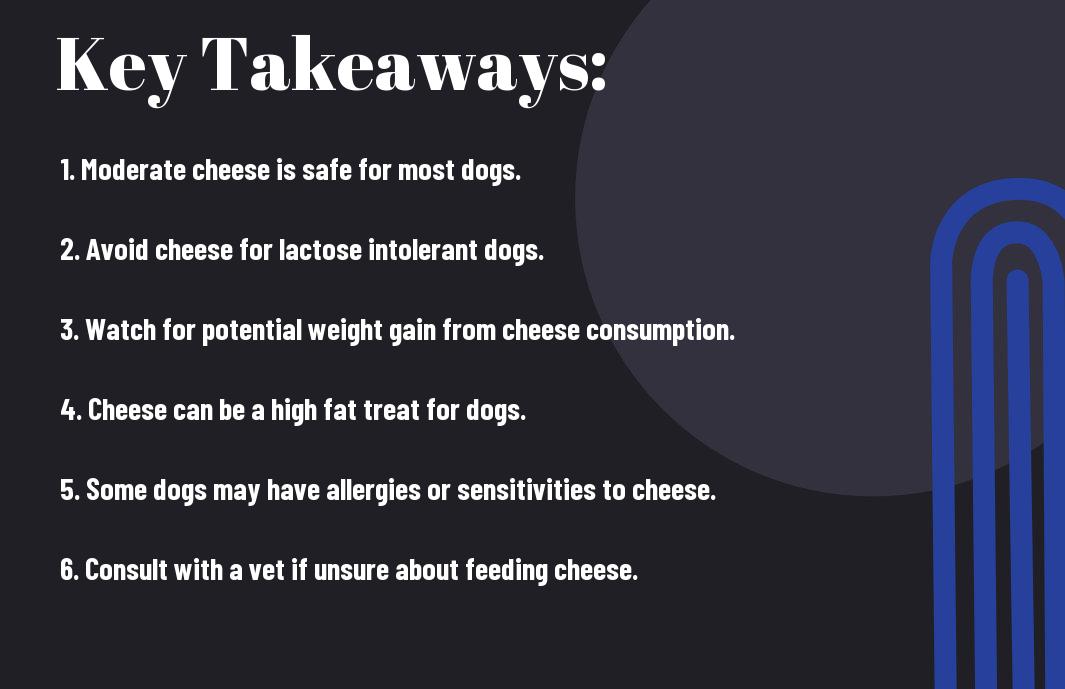Have you ever wondered if cheese is bad for your furry friend? While cheese can be a tasty treat for dogs, it’s vital to be mindful of the potential downsides. Some dogs may be lactose intolerant, leading to digestive issues like gas or diarrhea. Additionally, cheese is high in fat and calories, so overindulging can contribute to obesity and other health problems. It’s okay to share a small amount with your pup occasionally, but be sure to choose low-fat options and monitor their reaction. Recall, moderation is key when it comes to treating your pet!
Key Takeaways:
- Cheese can be enjoyed in moderation: Cheese is not inherently toxic to dogs, but it should be given in small quantities as an occasional treat.
- Watch out for lactose intolerance: Some dogs may not digest dairy products well due to lactose intolerance, leading to digestive issues like diarrhea. Monitor your dog’s reaction to cheese carefully.
- Choose the right types of cheese: Opt for low-fat and low-sodium cheeses like mozzarella or cottage cheese. Avoid giving dogs cheese with added ingredients like garlic or spices, as they can be harmful to dogs.
The Nutritional Value of Cheese
Protein and Fat Content
For protein and fat content, cheese can be a good addition to your dog’s diet. Cheese is a rich source of protein, which is crucial for your dog’s overall health, supporting muscle growth and repair. Additionally, the fat content in cheese provides your dog with a concentrated source of energy.
Lactose and Calcium Levels
The lactose and calcium levels in cheese are important factors to consider when feeding it to your dog. The lactose content in cheese is relatively low compared to other dairy products, making it easier for some dogs to digest. As for calcium, cheese is a good source of this crucial mineral which helps support your dog’s bone health.
With that said, it’s crucial to monitor your dog’s reaction to cheese consumption, especially if your dog is lactose intolerant or has a history of digestive issues. Some dogs may have difficulty digesting dairy products, leading to gastrointestinal upset such as gas, diarrhea, or vomiting.
Can Dogs Digest Cheese?
The question of whether dogs can digest cheese is a common concern among pet owners. The answer is not straightforward, as it depends on various factors such as the lactase enzyme and the dog’s breed.
The Role of Lactase Enzyme
For dogs to properly digest lactose, the sugar found in dairy products like cheese, they need an enzyme called lactase. Lactase is responsible for breaking down lactose into simpler sugars that can be absorbed by the body. However, not all dogs have high levels of lactase, which can lead to lactose intolerance and digestive issues when they consume cheese.
Dog Breeds and Their Ability to Digest Dairy
An important factor to consider is that certain dog breeds have higher levels of lactase and can therefore digest dairy products like cheese more effectively. Breeds such as Border Collies and Australian Shepherds are known to have higher tolerance to lactose, while others like Bulldogs and Pugs may struggle more with dairy digestion.
Potential Health Risks
Obesity and Weight Gain
After indulging in cheese, your dog may be at risk of obesity and weight gain. With its high fat and calorie content, cheese can contribute to your pet consuming more calories than needed, leading to potential weight issues. If not monitored and controlled, this could result in obesity, which can bring about a range of health problems for your furry friend.
Gastrointestinal Issues
Gastrointestinal problems may arise in your dog after consuming cheese. Some dogs may have difficulty digesting dairy products due to lactose intolerance. This can lead to symptoms like diarrhea, gas, and bloating. In some cases, your dog may also experience vomiting or stomach discomfort after eating cheese.
To prevent gastrointestinal issues, it’s vital to introduce cheese slowly into your dog’s diet and monitor their reaction. Some dogs may tolerate cheese better than others, so it’s crucial to observe how your pet responds to this treat.
Allergic Reactions and Intolerances
Health issues such as allergic reactions and intolerances can also be a concern when feeding cheese to your dog. Some dogs may be allergic to dairy products like cheese, leading to symptoms like itching, inflammation, or gastrointestinal distress. Lactose intolerance is another common issue that can cause digestive upset in dogs after consuming cheese.
Another important point to consider is that certain types of cheese contain ingredients like garlic or onions, which can be toxic to dogs. It’s crucial to be aware of the potential allergens in cheese and monitor your dog for any adverse reactions when introducing this food into their diet.
The Dangers of Cheese in Excess
Despite being a favorite treat for many dogs, cheese can pose several dangers when consumed in excess. It’s necessary to be aware of these risks to keep your furry friend safe and healthy.
Choking Hazards from Stringy Cheese
Cheese, especially stringy types like mozzarella, can be a choking hazard for dogs. If your pup eagerly gulps down a large piece of cheese without chewing it properly, it can get stuck in their throat and lead to a choking incident. To prevent this, always cut cheese into small, manageable pieces before offering it to your dog.
Pancreatitis and Cheese Fatty Acids
An excess intake of cheese can also contribute to pancreatitis in dogs. Cheese is high in fat, which can trigger inflammation of the pancreas and cause digestive issues. For instance, if your dog consumes a large amount of cheese in one sitting, it can overwhelm their digestive system and lead to pancreatitis.
Calcium Overload and Kidney Damage
An overabundance of cheese can also result in a calcium overload in your dog’s system. Excessive calcium levels can strain the kidneys and potentially lead to kidney damage over time. It’s crucial to monitor your dog’s cheese intake and ensure it aligns with their dietary needs to prevent any long-term health complications.
Hazards
Therefore, while cheese can be a tasty and enjoyable treat for your dog, it’s necessary to offer it in moderation to avoid these potential dangers. By being mindful of your dog’s cheese intake and opting for healthier alternatives, you can ensure that they stay happy and healthy for years to come.
Safe Cheese Options for Dogs
Low-Fat and Low-Lactose Cheeses
With your furry friend in mind, it’s crucial to choose low-fat and low-lactose cheeses to keep them healthy and happy. Opt for cheeses like mozzarella, cottage cheese, or Swiss cheese as they are lower in fat and lactose content compared to other varieties. These options are easier for dogs to digest and less likely to cause stomach upset or digestive issues.
Cheese Alternatives and Substitutes
Cheese can be a tasty treat for your dog, but if you’re looking for alternatives or substitutes, there are plenty of options to consider. Some dogs may be lactose intolerant or have dietary restrictions that make traditional cheese a less than ideal choice. In such cases, you can explore alternatives like non-dairy cheese products made from ingredients like soy or almonds. These alternatives can provide a similar texture and flavor to cheese without the potential digestive issues.
Substitutes such as plain yogurt or kefir can also be a good option to add a creamy and tangy taste to your dog’s meals while providing beneficial probiotics for their gut health. Remember to introduce any new food gradually to ensure your dog’s digestive system adjusts well.
Feeding Cheese to Dogs Responsibly
Moderation and Portion Control
One of the key factors to keep in mind when offering cheese to your furry friend is moderation and portion control. While cheese can be a tasty treat for dogs, it is crucial to remember that too much of a good thing can lead to health issues. Cheese is high in fat and calories, so be sure to limit the amount you give to your dog to avoid weight gain and digestive issues.
Avoiding Cheese as a Regular Treat
The temptation to spoil your dog with cheese regularly might be strong, but it’s crucial to resist this urge. The high-fat content in cheese can lead to obesity and other health issues in dogs if given too frequently. Instead, reserve cheese for special occasions or as an occasional indulgence to keep your dog healthy and happy.
The key is to ensure that cheese is not a staple in your dog’s diet, but rather an occasional supplement to their regular meals. By doing so, you can prevent any adverse effects that excessive cheese consumption may have on your furry companion.
Monitoring Your Dog’s Reaction to Cheese
Cheese may not sit well with all dogs, so it’s important to monitor your dog’s reaction whenever you offer them this treat. Watch out for any signs of digestive upset such as diarrhea, vomiting, or gas. If you notice any adverse effects, it’s best to avoid feeding cheese to your dog in the future.
A sudden change in your dog’s behavior or bathroom habits after eating cheese could indicate a sensitivity or intolerance to dairy. If you suspect that cheese is causing issues for your dog, consult your veterinarian for advice on alternative treats or dietary adjustments.
To wrap up
Considering all points, it is important to remember that cheese should be given to your dog in moderation. While small amounts of cheese can be a tasty treat for your furry friend, too much can lead to obesity, digestive issues, or potential lactose intolerance. It’s always a good idea to consult with your veterinarian before introducing any new foods into your dog’s diet, including cheese. For more information on what foods are safe for your dog, you can visit Can dogs eat cheese?.
FAQ
Q: Is cheese bad for dogs?
A: Cheese is not inherently bad for dogs, but it should be given in moderation. Some dogs may be lactose intolerant, so it’s important to monitor how your dog reacts after consuming cheese.
Q: Can dogs eat all types of cheese?
A: Not all types of cheese are safe for dogs. Some cheeses, such as blue cheese, can be toxic to dogs. It’s best to stick to plain, low-fat varieties like cheddar or mozzarella.
Q: How much cheese can I give my dog?
A: Cheese should only be given to dogs as an occasional treat and in small amounts. Too much cheese can lead to digestive issues and obesity in dogs.
Q: What are the benefits of giving cheese to dogs?
A: Cheese can be a good source of protein and calcium for dogs. It can also be used as a high-value treat for training purposes.
Q: Are there any alternatives to cheese for dogs?
A: Yes, there are many dog-friendly alternatives to cheese, such as plain cooked meats, fruits, and vegetables. It’s always best to consult with your veterinarian before introducing new foods to your dog’s diet.
Are strawberries toxic for dogs
Demystifying Anal Gland Issues in Dogs: Your Comprehensive Guide from the American Kennel Club




